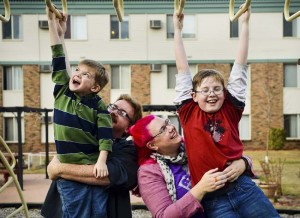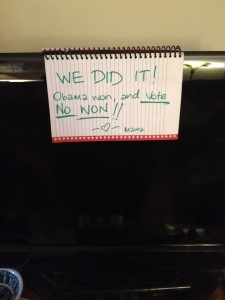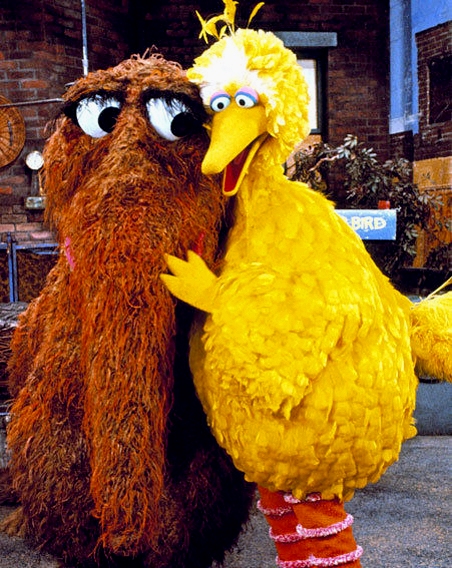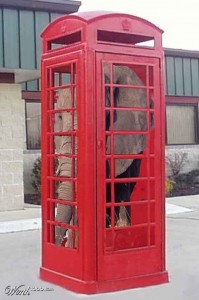 I’ve been working on the campaign for marriage equality here in Minnesota since March, and as I’ve written before, it’s the most fulfilling political, social, and activist project I’ve ever worked on. I’m a total addict to the amazing people and experiences I encounter every single time I put in some time, and I’m going to crash hard on November 7, even if we manage to win. I’m already getting the shakes. Last night, I asked my friend and co-trainer Scott, who works in politics for his day job, for a new campaign–I’m lining up a new dealer once Minnesotans United for All Families skips town.
I’ve been working on the campaign for marriage equality here in Minnesota since March, and as I’ve written before, it’s the most fulfilling political, social, and activist project I’ve ever worked on. I’m a total addict to the amazing people and experiences I encounter every single time I put in some time, and I’m going to crash hard on November 7, even if we manage to win. I’m already getting the shakes. Last night, I asked my friend and co-trainer Scott, who works in politics for his day job, for a new campaign–I’m lining up a new dealer once Minnesotans United for All Families skips town.
MN United has built a campaign unlike any other, rejecting the messages and tactics that have failed in 30 states where anti-marriage amendments have gone up for a popular vote. While talk about the rights and benefits that attach to marriage, and how the denial of those rights amounts to separate-but-equal discrimination on par with civil rights fights of the past, are important to many supporters of marriage equality, they aren’t generally persuasive for people who are on the fence about gay marriage. So we’re having personal conversations with voters, using our own life stories, to make it clear that marriage is about love and commitment, no matter the gender of the partners. These stories are powerful, and they change hearts and minds and votes.
Only four days remain until the election, so I’m going to share the core of the conversations I’ve been having with you today. If you’re in one of the four states voting on marriage equality, I hope that this strengthens your resolve if you’re a supporter, and opens your heart to the conversation if you’re still undecided.

Our first walk as Mr. and Mrs. Banks, 5 October 1996
I find this amendment personally hurtful on so many levels. I have the great good fortune to be married to the love of my life, despite the astronomical odds that we would ever find one another on opposite sides of the world. And for the last sixteen years, we’ve had each other in good times and bad. I’ve rejoiced in the affection and the support and the million inside jokes and shorthand references that weave us closer, and I’ve buckled with relief into that tightly knit fabric of partnership in the times of crisis and grief. I think marriage is the best game in town, and I devoutly wish the same celebration and endorsement for every loving, committed couple who lean into the unknown future together.
All of this hinges, though, on one critical fact: my beloved was the opposite gender. When we fell madly in love, we had many obstacles to overcome so we could be together, but the legal right for me to marry him and secure his immigration status so we could start our new life together was not one of them. We obtained a K-1 “fiance” visa that allowed him to enter the country and get on the fast track for a green card by submitting evidence of our marriage. We went through the separate interviews to assure our marriage wasn’t a scam.
But I’m bisexual. There was no guarantee that my soulmate would be a man. And if he weren’t, the last sixteen years–all the love, all the progress, all the family we’ve built–disappear. That one thought blows through my gut like an icy wind and fills me with unbearable sorrow. I cannot imagine the pain and devastation of being told I couldn’t marry and be with my beloved.
And I look at my amazing, difficult, brilliant, gorgeous, perfect sons, and I marvel even more. We didn’t have to submit any applications or pass any interviews before we decided to conceive them, and not once have we ever had to fear that they would be taken away from us. We’re far from perfect parents, but no one has ever questioned whether we’re the best people to raise them. It’s assumed that they’re safe and happy and healthy and loved, and there’s no awkwardness when I introduce their other parent at school events or church functions.
 Believe me, all this “traditional”-ness is positively mortifying to a weird, eclectic nonconformist like me. Frankly, it’s embarrassing. We didn’t set out to create a “traditional” family, and we’ve done everything in our power to the least traditional traditional family around. But we are very aware of our privilege, and there’s no reason in the world it should be reserved to our narrow demographic.
Believe me, all this “traditional”-ness is positively mortifying to a weird, eclectic nonconformist like me. Frankly, it’s embarrassing. We didn’t set out to create a “traditional” family, and we’ve done everything in our power to the least traditional traditional family around. But we are very aware of our privilege, and there’s no reason in the world it should be reserved to our narrow demographic.
Marriage is an important but limited part of how I envision family. I’m a child of divorce, and even as an eight-year-old, I knew that my mother and father weren’t working out. I knew that marriage stood in the way of being our best selves, and I told my mom often as a kid, then a teenager, then an adult, that she made the right call. That divorce didn’t dissolve the ties of family, though–I’m still close with my father’s family, and I kept my birth last name as a second middle name when my stepdad adopted us years later. But I also watched my grandparents’ marriage, which started with my grandma saying, “I’ll marry you so I can get out of the house before I kill my sister. But if it doesn’t work out, you go your way, I’ll go mine, and no hard feelings.” It lasted 62 years.
We teach our sons that families come in all shapes and sizes. Of course, we didn’t have to work too hard to teach them this: they already knew it. They have friends who have a mom and a dad like they do, and friends who only live with their mom or their dad, or travel between their parents’ houses. They know friends who live with extended family, or foster parents, or adoptive families. And they know friends with two dads or two moms. All they care about is that their friends are as loved and secure as they are.
So I’m voting no.
I’m voting no because I treasure my marriage. No other word in our language and society so completely sums up the lifelong commitment and enduring love that I share with my partner, and it hurts to imagine being told that we didn’t qualify for that word by something we couldn’t change or improve. My marriage is strong, and no married gay couple down the street, arguing about bills and chores like we do, makes that less secure.
I’m voting no because I hold my sons in hope and love. I feel that they’re better people because we’ve taught them that every person is worthy of the same dignity, no exceptions. My dream for my boys is to dance at their weddings, and the only thing I care about is that the person they marry loves them as much as I love their father. I’m going to dance, it’s going to be Bad Mom Dancing, and it’s going to live on in infamy on YouTube, to forever embarrass them, like every good mom should.
I’m voting no because my understanding of the world’s faiths teaches me that the most universal truth among humans is to treat one another the way we would want to be treated. Whether it’s the Judeo-Christian Golden Rule, or the Confucian Silver Rule, this is held as a central tenet. We rarely follow the ancient scriptures that prohibit same-sex partners on other subjects; we acknowledge that they’re historical documents, and that society’s values have evolved since they were written. I want my church to have the religious freedom to marry gay and lesbian couples as our faith embraces as equally entitled.
I’m voting no because I’m a historian. I can see that the institution of marriage predates the Bible and that it began as an economic transaction to link families and secure heredity. It was not always a sacrament, and it was not always available to every heterosexual couple. It hasn’t “always been” any particular way. Marriage for love is a damned newfangled idea, relatively speaking. If you married someone not from your hometown, you’re already breaking “traditional” convention, let alone someone of a different church, faith, ethnic group, or race.
I’m voting no because I’m a teacher and a parent, and the health, safety, and wellbeing of every child matters to me. I can’t imagine the horror of waiting to know how the state where they were born is going to vote on whether they and their families are welcome. LGBT youth are so fragile already, under siege in schools and churches and media, and it’s a sacred trust we are given to show them that they can aspire to fully participate in society and experience the range of human love. I have great confidence that other teachers will continue to teach age-appropriate lessons, and that as parents we still have the greatest power to teach our children about morality.
I’m voting no because I’m a patriot. I believe in the founding principles of our country, especially the purpose of our constitution as a document that secures personal freedoms and limits government intrusions. The constitution should never be used to carve out a segment of the population and deprive them of the same liberties as others enjoy. And we certainly shouldn’t be putting rights up for a popular vote. Ideological conservatives have made some of the most persuasive arguments along these lines.
I’m voting no because I’m an optimist, and I believe our society is moving toward a broader, more inclusive understanding of one another. The less we allow race, gender, faith, class, and sexual orientation to cloud our vision of a common humanity, the more we will recognize that we all want the same thing. We’ve got a long way to go on all of those issues, but we can (and should!) work on them simultaneously. I reject the arguments of fear, division, and misunderstanding, and I put my hope in the journey we’re on toward life, liberty, and the pursuit of happiness.

 Political Science, Uncategorized
Political Science, Uncategorized  No Comments
No Comments  The term mandate comes directly out of Latin, which is unsurprising, since most ideas of political power were defined—in one way or another—by those experts in bureaucracy, the Romans. But the etymology suggests something more of a public trust: mandate means “to give into the hand” (manus = hand; dare = to give). Romans used the past participle, mandatum, to mean something given into a person’s care.
The term mandate comes directly out of Latin, which is unsurprising, since most ideas of political power were defined—in one way or another—by those experts in bureaucracy, the Romans. But the etymology suggests something more of a public trust: mandate means “to give into the hand” (manus = hand; dare = to give). Romans used the past participle, mandatum, to mean something given into a person’s care.  So there’s already both a political/legal sense of the word that existed alongside a very spiritual idea of trust and care. And the Romans weren’t the only ones to invest the word mandate with those dual meanings. Ancient China, starting in the Zhou Dynasty (1046-256 BCE), ascribed its rulers with the mandate of heaven. To the Western eye, the mandate of heaven looks like a version of the divine right of rulers. But in China, the endorsement of the divine depended on continued moral leadership (both leadership with morals and demonstrating exemplary morals), and if the leader was not sufficiently generous, just, conservative (in the small “c” sense of conserving tradition and resources for future generations), and observant of religious obligations, then Heaven would revoke its mandate. This could serve as justification—even an endorsement—for popular uprising and the overthrow of the regime. (1)
So there’s already both a political/legal sense of the word that existed alongside a very spiritual idea of trust and care. And the Romans weren’t the only ones to invest the word mandate with those dual meanings. Ancient China, starting in the Zhou Dynasty (1046-256 BCE), ascribed its rulers with the mandate of heaven. To the Western eye, the mandate of heaven looks like a version of the divine right of rulers. But in China, the endorsement of the divine depended on continued moral leadership (both leadership with morals and demonstrating exemplary morals), and if the leader was not sufficiently generous, just, conservative (in the small “c” sense of conserving tradition and resources for future generations), and observant of religious obligations, then Heaven would revoke its mandate. This could serve as justification—even an endorsement—for popular uprising and the overthrow of the regime. (1) But, more than ever, it’s important for our leaders to proceed knowing, as the Romans and Chinese knew, that they hold their power in their hands—they hold the people in their hands. And it is a fragile thing, so easily crushed by inattention and the flexes of muscle demanded by other parts of the job. Though Bush’s presidency represented it in absolutely no way at all, I appreciate the idea of “compassionate conservatism.” The people and their trust must be treated with compassion, not ruthless budgetary efficiency or wasteful military squandering, or neither of them can be conserved for the good of the country’s future.
But, more than ever, it’s important for our leaders to proceed knowing, as the Romans and Chinese knew, that they hold their power in their hands—they hold the people in their hands. And it is a fragile thing, so easily crushed by inattention and the flexes of muscle demanded by other parts of the job. Though Bush’s presidency represented it in absolutely no way at all, I appreciate the idea of “compassionate conservatism.” The people and their trust must be treated with compassion, not ruthless budgetary efficiency or wasteful military squandering, or neither of them can be conserved for the good of the country’s future. 



 I’ve been working on the campaign for marriage equality here in Minnesota since March, and
I’ve been working on the campaign for marriage equality here in Minnesota since March, and 






 The
The 



 Haidt also shares the results of his research into the moral foundations on which the edifices of conservative and liberal thought are built, and his conclusion is that part of the success of the modern conservative movement is based on the fact that conservative ideology appeals to a broader array of moral options than liberalism does. Since liberals often think of conservatives as “narrow-minded,” this sounds counter-intuitive, but really, it’s not. Liberals, Haidt demonstrates, derive their moral judgments almost entirely from whether something cares for or harms other beings, or whether it seems equalizing or discriminatory. Conservatives, on the other hand, respond less strongly to equality and care/harm, but additionally respond to messages of proportionality (more/less work=more/less reward), loyalty (to kin and other identity groups), sanctity (upholding standards of purity or pollution), and authority (respect for institutions), while many liberals actually perceive a threat from high degrees of those sources of morality. I think he’s really on to something, and I agree with what I heard Howard Dean talk about in a speech at Penn State, all the way back in 2004–that progressives won’t be able to accomplish their goals until they learn to articulate the morality of their position from all of these angles, and tap into the emotional heart of their message.
Haidt also shares the results of his research into the moral foundations on which the edifices of conservative and liberal thought are built, and his conclusion is that part of the success of the modern conservative movement is based on the fact that conservative ideology appeals to a broader array of moral options than liberalism does. Since liberals often think of conservatives as “narrow-minded,” this sounds counter-intuitive, but really, it’s not. Liberals, Haidt demonstrates, derive their moral judgments almost entirely from whether something cares for or harms other beings, or whether it seems equalizing or discriminatory. Conservatives, on the other hand, respond less strongly to equality and care/harm, but additionally respond to messages of proportionality (more/less work=more/less reward), loyalty (to kin and other identity groups), sanctity (upholding standards of purity or pollution), and authority (respect for institutions), while many liberals actually perceive a threat from high degrees of those sources of morality. I think he’s really on to something, and I agree with what I heard Howard Dean talk about in a speech at Penn State, all the way back in 2004–that progressives won’t be able to accomplish their goals until they learn to articulate the morality of their position from all of these angles, and tap into the emotional heart of their message.

